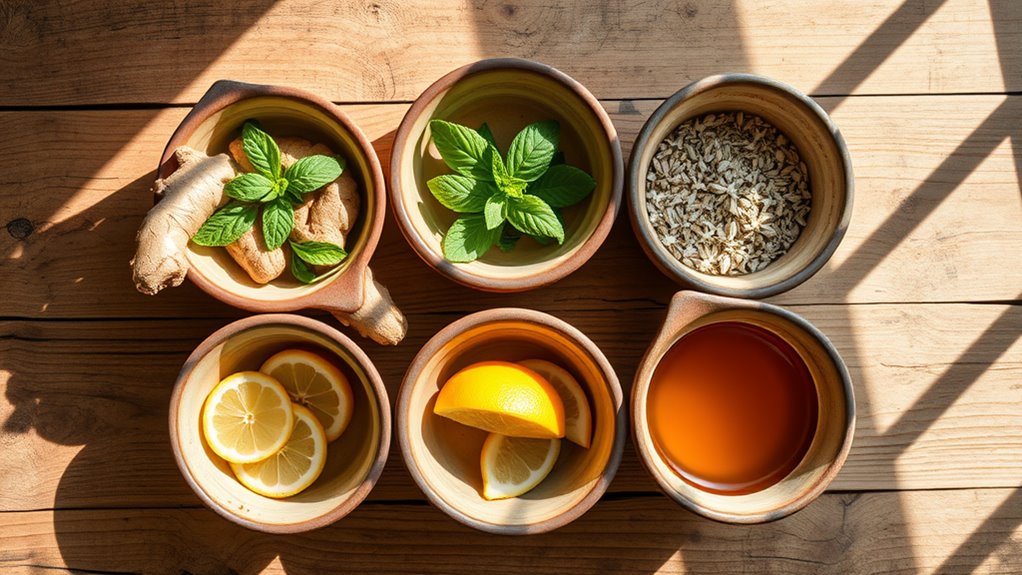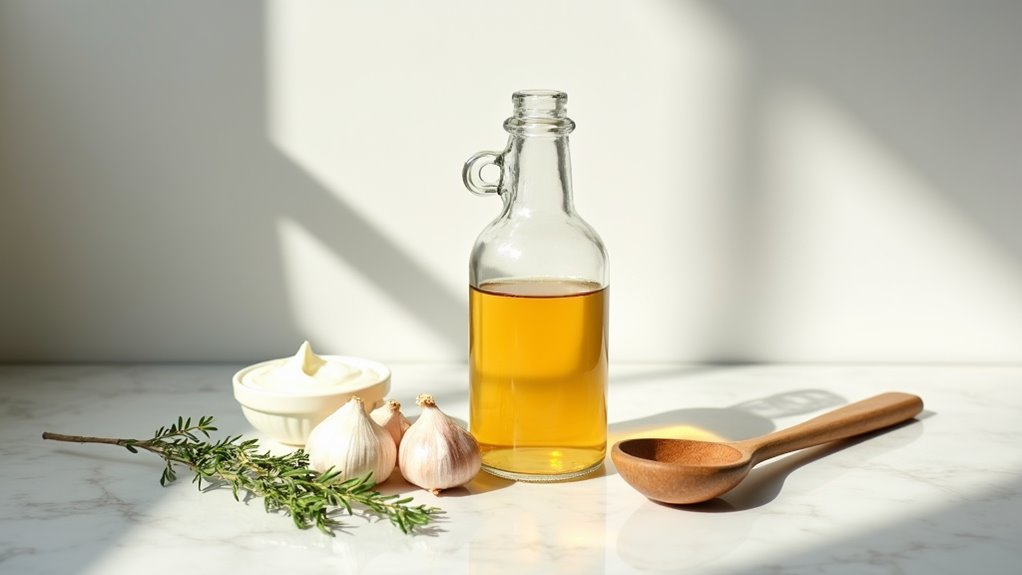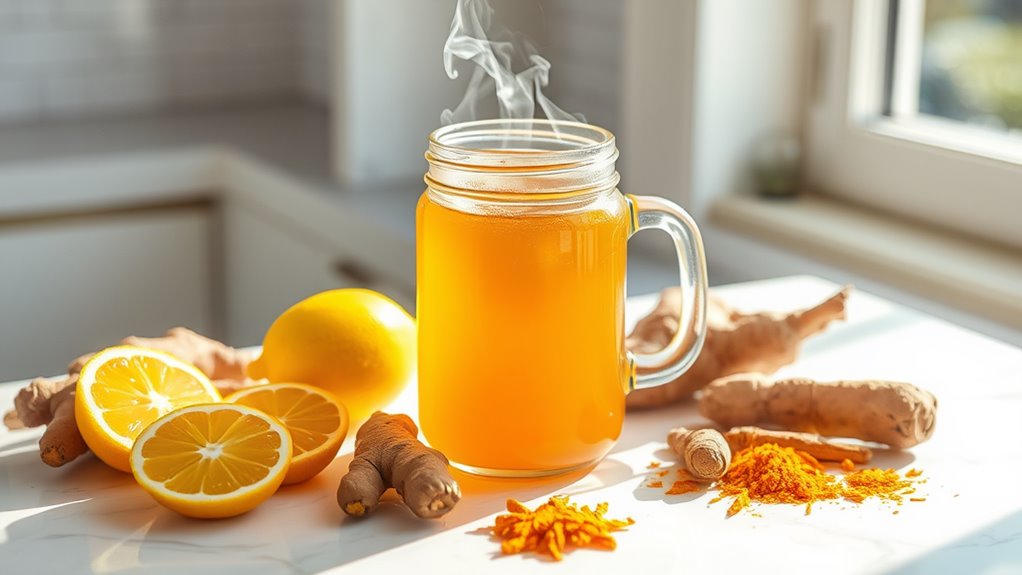Natural Ways to Relieve a Bloated Belly-Quick and Easy
You’ll find quick relief from bloating through several natural remedies. Try sipping peppermint, ginger, or fennel tea to reduce gas and ease digestion. Practice gentle yoga poses like Child’s Pose or Cat-Cow to release trapped air. Massage your abdomen in circular motions following the direction of your large intestine. Stay hydrated with room-temperature water, and eat slowly to minimize air intake. These proven techniques are just the beginning of your journey to optimal digestive comfort.
Understanding What Causes Bloating
Although bloating is a common digestive complaint affecting up to 30% of Americans, it’s important to understand that it stems from multiple potential causes.
When seeking bloated belly remedies, you’ll need to identify your specific triggers. These can include eating too quickly, consuming gas-producing foods, swallowing excess air, food intolerances, or underlying digestive disorders.
Hormonal changes, particularly in women, can also contribute to bloating. Additionally, an imbalanced gut microbiome, consuming too much sodium, or certain medications may cause fluid retention and that uncomfortable swollen feeling in your abdomen.
Practicing mindful eating techniques like taking smaller bites and chewing thoroughly can significantly reduce the amount of air swallowed during meals.
Simple Herbal Tea Remedies
Once you’ve identified your bloating triggers, herbal teas offer a gentle, natural approach to relief.
Peppermint tea reduces intestinal spasms and gas by relaxing your digestive muscles.
Ginger tea contains compounds that improve digestion and reduce inflammation.
Fennel tea’s natural compounds help decrease gas production and ease stomach discomfort.
Chamomile tea’s anti-inflammatory properties soothe digestive distress, while dandelion root tea acts as a mild diuretic to reduce water retention.
For optimal results, steep your chosen tea for 5-10 minutes and drink it 30 minutes before meals.
You’ll find these teas readily available at most grocery stores or health food shops.
Adding cumin seed tea to your routine can provide additional gas relief and digestive support.
Essential Stretches and Yoga Poses
When your belly feels bloated, specific stretches and yoga poses can help stimulate digestion and release trapped gas.
These gentle movements massage your internal organs and promote healthy gut function, providing quick relief from discomfort.
- Child’s Pose (Balasana) – Kneel and fold forward, extending your arms while pressing your belly against your thighs to apply gentle pressure on your digestive system
- Cat-Cow Pose (Marjaryasana-Bitilasana) – Alternate between arching and rounding your spine to massage abdominal organs
- Supine Twist (Jathara Parivartanasana) – Lie on your back, hug knees to chest, then twist to each side to release trapped gas
Combining these poses with mindful breathing techniques can enhance digestion and minimize stress-related bloating symptoms.
Foods That Fight Bloating
Since certain foods can trigger bloating while others help prevent it, choosing the right ingredients is crucial for maintaining digestive comfort.
You’ll find relief by incorporating ginger, which contains natural anti-inflammatory compounds that aid digestion. Potassium-rich bananas help regulate fluid balance, while probiotic-containing yogurt supports healthy gut bacteria. Fennel seeds can reduce gas and bloating thanks to their carminative properties.
Add cucumber and watermelon to your diet, as their high water content helps flush excess sodium. Peppermint tea relaxes digestive muscles, while asparagus acts as a natural diuretic.
Choose these foods regularly to minimize bloating discomfort.
Like ancient healing traditions, many cultures have long recognized the power of natural ingredients like turmeric mixed with warm milk to reduce inflammation and digestive discomfort.
Mindful Eating Techniques
You’ll reduce bloating by taking your time to eat each meal mindfully instead of rushing through it.
When you eat slowly and focus on each bite, you’re less likely to swallow excess air, which is a common cause of bloating.
Taking smaller bites and thoroughly chewing your food also helps your digestive system process meals more efficiently, leading to better nutrient absorption and less gastric distress.
Slow Down While Eating
One of the most effective ways to reduce bloating is practicing mindful eating by slowing down your meal pace. When you eat too quickly, you’re more likely to swallow excess air and overeat before your brain registers fullness.
To help you slow down while eating:
- Put your fork down between bites and chew each mouthful 20-30 times.
- Set a minimum time of 20 minutes for completing your meal.
- Take small sips of water between bites instead of drinking large amounts at once.
This approach allows proper digestion, reduces air intake, and helps your body better process nutrients.
Focus On Each Bite
Practicing mindful eating goes beyond simply eating slowly – it requires fully engaging with each bite through all your senses. Focus on the texture, temperature, and flavors as you chew. This heightened awareness helps your brain better register fullness signals and improves digestion.
| Sense | How to Engage |
|---|---|
| Sight | Notice colors and presentation |
| Smell | Inhale aromas before tasting |
| Touch | Feel textures in your mouth |
When you’re mindful of each bite, you’ll naturally chew more thoroughly and swallow less air, reducing bloating. You’ll also be more likely to notice which foods trigger digestive discomfort, helping you make better dietary choices.
Quick Home Massage Methods
When you’re feeling bloated, a gentle circular massage on your abdomen can help stimulate digestion and encourage trapped gas to move through your system.
You’ll want to use your fingertips to massage clockwise around your navel, following the natural direction of your digestive tract.
To specifically target gas pockets, you can apply light pressure with your palm in a downward motion along the left side of your abdomen, which helps guide trapped air toward its natural exit point.
While massaging, try incorporating essential oils like peppermint for additional digestive comfort and relief.
Circular Tummy Massage
Gentle circular massage techniques can help relieve bloating by stimulating digestion and encouraging the movement of trapped gas through your intestinal tract.
When performing a circular tummy massage, follow these essential steps:
-
Lie down flat on your back and apply a light amount of pressure with your fingertips around your navel area.
-
Move your fingers in slow, clockwise circles that gradually expand outward, following the direction of your large intestine’s natural flow.
-
Continue this motion for 5-10 minutes, maintaining consistent pressure while focusing on any areas that feel particularly tender or bloated.
Gentle Gas Release Techniques
Beyond circular massage techniques, targeted pressure points can offer quick relief from trapped gas and bloating. You’ll find specific spots on your body that, when gently pressed, help release trapped air and ease discomfort.
| Pressure Point | Application Method |
|---|---|
| CV6 (2″ below navel) | Press firmly for 30 seconds |
| ST25 (side of navel) | Circular motion, 1 minute |
| Large intestine 4 | Squeeze point between thumb and index finger |
| Pericardium 6 | Press inner wrist, three fingers from crease |
Apply gentle pressure to these points for 1-2 minutes while breathing deeply. If you experience pain, stop immediately and consult your healthcare provider.
Hydration and Bloating Relief
Proper hydration plays a vital role in reducing bloating and supporting healthy digestion. When you’re dehydrated, your body retains water, leading to that uncomfortable puffy feeling.
You’ll need to drink enough fluids throughout the day to maintain optimal digestive function.
- Aim for 8-10 glasses of water daily, spacing them between meals rather than during eating.
- Choose room temperature water instead of ice-cold drinks, which can constrict your digestive tract.
- Add natural enhancers like lemon, cucumber, or mint to your water to boost its digestive benefits and increase your fluid intake.
Adding ginger and lemon to your water can help reduce inflammation while supporting healthy digestion throughout the day.
Natural Supplements for Digestive Health
While prescription medications can help with digestive issues, several natural supplements have shown promise in alleviating bloating and supporting gut health.
Peppermint oil capsules work as antispasmodics to reduce abdominal pain and gas.
Probiotics containing Lactobacillus and Bifidobacterium strains help restore healthy gut bacteria balance.
Ginger supplements can ease digestive discomfort and reduce inflammation.
Digestive enzymes support proper food breakdown, while fennel seed supplements help relax digestive muscles.
Activated charcoal can absorb excess gas, though you’ll need to take it away from other medications.
Deep breathing exercises practiced for 5-10 minutes on an empty stomach can enhance the effectiveness of natural supplements.
Always consult your healthcare provider before starting any supplement regimen.
Daily Habits to Prevent Bloating
Making small adjustments to your daily routine can significantly reduce bloating and digestive discomfort.
Research shows that consistent lifestyle habits play a crucial role in maintaining optimal gut health and preventing uncomfortable belly bloat.
-
Eat slowly and chew thoroughly – this reduces the amount of air you swallow and helps break down food properly before it reaches your stomach.
-
Stay hydrated by drinking water between meals rather than during meals to prevent diluting digestive enzymes.
-
Move your body for at least 15 minutes after meals to stimulate digestion and prevent gas buildup.
Studies suggest that incorporating ginger and peppermint into your diet can naturally speed up gastric emptying and reduce digestive cramping.
When to Seek Medical Help
While occasional bloating is common, you’ll need to consult your doctor if you experience severe abdominal pain, especially when accompanied by fever or bloody stools.
If your bloating persists for weeks without relief despite lifestyle changes, this could indicate an underlying medical condition that requires professional evaluation.
You should also seek medical attention when bloating occurs with concerning digestive changes like unexplained weight loss, severe constipation, or difficulty swallowing.
Severe Pain Warning Signs
Although most bloating resolves on its own, certain warning signs indicate you need immediate medical attention.
If you experience severe abdominal pain alongside bloating, don’t ignore these potentially dangerous symptoms.
-
Seek emergency care if you have intense pain accompanied by fever over 102°F, bloody stools, or persistent vomiting.
-
Get immediate help if your abdomen is extremely tender to touch or you notice rapid swelling within a few hours.
-
Call 911 if you have chest pain radiating to your abdomen, difficulty breathing, or signs of severe dehydration.
These symptoms could signal serious conditions like appendicitis, bowel obstruction, or peritonitis.
Persistent Long-Term Bloating
When bloating persists for several weeks or months without relief, it’s important to consult your healthcare provider since chronic bloating can signal underlying medical conditions.
Persistent bloating may indicate serious issues like celiac disease, inflammatory bowel disease, or ovarian cancer.
Watch for red flags such as unexplained weight loss, blood in stool, severe abdominal pain, or changes in bowel habits. Your doctor can perform diagnostic tests, including blood work, imaging studies, or endoscopy, to identify the root cause.
Don’t dismiss ongoing bloating as merely a dietary issue, especially if it’s accompanied by fatigue, fever, or night sweats.
Early detection and treatment of underlying conditions improve outcomes.
Concerning Changes in Digestion
Changes in your digestive patterns can reveal important clues about your overall health.
When bloating persists or worsens, it’s crucial to recognize warning signs that require medical attention.
-
Contact your healthcare provider if you experience unexplained weight loss, severe abdominal pain, or bloody stools alongside bloating.
-
Seek immediate care when bloating occurs with fever, intense vomiting, or severe constipation lasting more than 3 days.
-
Schedule an evaluation if you notice persistent changes in bowel habits, difficulty swallowing, or early satiety after eating small amounts.
These symptoms could indicate underlying conditions requiring professional diagnosis and treatment.







